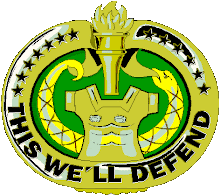Kerry's "Global Test"
Looks like a veto, acts like a veto - it's... the 'Global Test'
Jonah Goldberg
October 6, 2004
John Kerry is supposed to be the man of nuance. But he can't seem to grasp the implications of his boldest foreign policy statement in last week's presidential debate - a principle that might be described as the "Mother, May I?" doctrine.
In the debate, you may recall, Kerry alluded to the "global test" a president must pass before committing troops to war. The Bush campaign, reeling from an unexpected loss in the first debate, wisely used Kerry's words against him. The next day Bush declared about his opponent: "He said that America has to pass a global test before we can use American troops to defend ourselves. . Senator Kerry's approach to foreign policy would give foreign governments veto power over our national security decisions." The Bush campaign followed up with an ad making much the same point.
The Kerry camp responded with something less than subtlety, immediately rolling out an ad saying, in effect, Liar, liar pants on fire. "George Bush lost the debate," the ad declared. "Now he's lying about it." Paul Krugman of the New York Times picked up the Democrats spin, also calling Bush a liar.
Krugman and the Kerry camp base their charge on this evidence: During the debate Kerry had said, "No president, through all of American history, has ever ceded, nor would I, the right to preempt in any way necessary to protect the United States of America." So you see, there's no way you can say that Kerry would give foreign leaders a "veto" over American national security.
No so fast. It all boils down to what Kerry means by "necessary."
Consider the parallel example of gun control. John Kerry - and most other liberals, as well as many conservatives - say they believe in the Second Amendment right to own guns. But they also believe in setting strict rules by which you can own, purchase and use guns. The gun-controller's position, in other words, is that, sure, you have the right to own a gun, but the state and the community have a right to put limitations on how you exercise it.
Yes, John Kerry believes presidents have the right to preemption. But he also believes that that right should be subject to serious regulations by the "international community," the United Nations and the opinions of our allies. These regulations are no less real because they are informal and take the form of Kerry's personal preferences.
Now, to be fair, George Bush cares about the opinions of our allies, the UN and the international community, too. But I don't think anyone will disagree when I say he cares about them much, much less than John Kerry does. In effect, the threshold for where and when Kerry will buck the opinions of foreign leaders - including all those mysterious ones who secretly want him to be president - is much, much higher than George W. Bush's.
In other words, John Kerry would not give foreigners an absolute veto over American national security, but he would almost surely give them a partial veto.
Look at it this way. If you believe that it's not worth going to war without what Kerry calls a "grand alliance" - except in the gravest of circumstances - then for all circumstances less than "grave" you've given the most reluctant members of that would-be alliance a veto. If you need five guys to play basketball, then any one of the five players has a veto power over whether you get on the court at all.
Now John Kerry says this is all unfair because, again, he says he would always reserve the right to act unilaterally. But that begs the question, Under what circumstances would he be willing to go it alone? We have a pretty good idea. During his speech to the Democratic convention, Kerry promised that he "will never hesitate to use force when it is required. Any attack will be met with a swift and certain response."
Bully for him. But so what? What presidential candidate - or other American - would suggest that America doesn't have the right to respond to a direct attack? The important question is under what other circumstances would Kerry be willing to buck international opinion and do what needed to be done? Kerry has yet to offer a serious answer to that question. When he's not supporting the Iraq war, he's calling it a failure because it didn't have the sort of the sort of "grand alliance" Bush's father mustered in 1991.
The problem, of course, is that Kerry opposed that war too. When he was a young man - but older than when he served in Vietnam - Kerry said that the UN should be in charge of American forces. He no longer says that, but it gives you a pretty good sense of where his heart's always been.
Kerry may not believe the "international community" should have a de jure veto over American national security, but it's hard to see how it wouldn't have a de facto one under a Kerry presidency.
Jonah Goldberg is editor-at-large of National Review Online, a Townhall.com member group.



0 Comments:
Post a Comment
<< Home